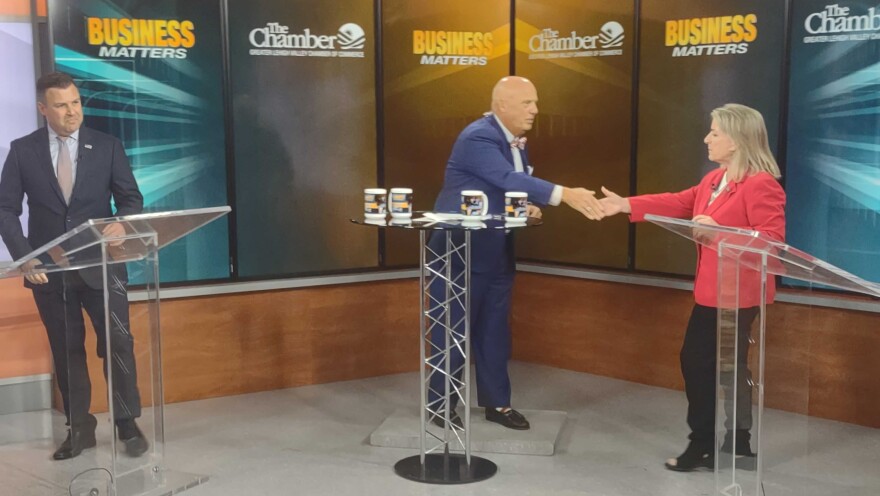SALISBURY TWP., Pa. — The Lehigh Valley's two congressional candidates faced off Friday afternoon in their first debate — a testy affair that saw the candidates clash over Social Security, the economy and military intervention abroad.
The hourlong debate pitted Democratic incumbent U.S. Rep. Susan Wild against challenger state Rep. Ryan Mackenzie, R-Lehigh. They're running to represent Pennsylvania's 7th Congressional District, one of the most contested U.S. House seats in the country.
Mackenzie, a 12-year veteran of Harrisburg, spent much of the debate on the attack.
He associated Wild with President Joe Biden on question after question, noting the news website FiveThirtyEight.com determined she voted with his administration 100% of the time. He blamed Wild and the president for failures at the Southern border, the wars in Israel and Ukraine, steep inflation and the rising costs of housing and prescription drugs.
"People are struggling, and it's not just one area. If you are looking at the panoply of things — whether it's housing, energy, food, health care — everything is up 20 percent," Mackenzie said.
Wild defended her record and touted her bipartisan chops throughout the program. She caught flak from fellow Democrats when she voted against a $3 trillion COVID relief bill in May 2020, she said, and former President Donald Trump signed some of her bills into law, including one that extended funding to programs like Meals on Wheels.
"My job is not to pick winners and losers at that level. My job is literally, as representative, is to make sure I am finding common ground with the president and working on issues that are so important to everybody in this community,"Susan Wild
When moderator Tony Iannelli asked whether she supported Vice President Kamala Harris taking over the Democratic ticket, Wild doubled down on bipartisanship.
"My job is not to pick winners and losers at that level. My job is literally, as representative, is to make sure I am finding common ground with the president and working on issues that are so important to everybody in this community," she said.
But Mackenzie didn't relent as Wild worked to present herself as a nuanced legislator. He accused her of sending muddled messages over her support of Israel and protesting the violence in Gaza.

As a member of the Committee on Foreign Affairs, she bears some blame for Russia's attack on Ukraine, Mackenzie said. Wild voted to send aid to the Ukrainian government, saying America must intervene to prevent a wider war in Europe with NATO countries. Mackenzie contended that U.S. intervention has only prolonged the war, led to more suffering and seen $100 billion of taxpayer dollars shipped overseas.
But Wild steamed when Mackenzie accused her of driving up health care costs by meddling in Medicare. Since taking office, Wild has consistently named lowering the costs of insulin and other prescription drugs as one of her top priorities.
As part of the Inflation Reduction Act, Democrats granted the federal government the ability to negotiate over high-cost prescription drugs available under Medicare. Ten drugs were negotiated under the program's first year, and the Biden administration has expressed interest in negotiating 15 a year for 2028.
However, Mackenzie argued that meddling in Medicare has only created more problems for seniors.
"What happened when Susan Wild put a cap on only some things but not others? Those pharma companies just shift the cost to something else. We see premiums skyrocketing right now," Mackenzie said.
Wild countered that she supported making more drug prices open to negotiation but that Republican lawmakers offered little to no support for the program. House Republicans have openly questioned whether the program is constitutional even though the Department of Veterans Affairs has operated under similar rules for years.
"We need a Democratic House and a Democratic president because the GOP will roll back those provisions," she said.
"I am the one running for office, not my party, and I will support Social Security and Medicare every single time"Ryan Mackenzie, Republican candidate for Pennsylvania's 7th Congressional District
Wild tried to turn the tables when the conversation shifted to Social Security. Both candidates vowed to protect the program, but Wild questioned Mackenzie's true level of support. Every Congress sees Republican lawmakers introduce legislation seeking to introduce cuts to the program.
"I am the one running for office, not my party, and I will support Social Security and Medicare every single time," Mackenzie fired back.
The debate was hosted by Tony Iannelli, president and CEO of the Greater Lehigh Valley Chamber of Commerce, on his "Business Matters" program at the WFMZ studio.
The first episode, mostly focusing on foreign affairs, will broadcast at 7:30 p.m. on Monday, Sept. 16. The second episode focuses more on domestic matters and will air at 7:30 p.m. on Monday, Sept. 23.
Pennsylvania's 7th Congressional District includes all of Carbon, Lehigh and Northampton counties plus a sliver of Monroe County. Registered voters are almost evenly split along party lines, making it some of the most coveted political territory in the United States.
With control of Congress decided by just a handful of seats over the past four years, both parties and their allies have committed tens of millions of dollars to winning the seat in recent elections.


